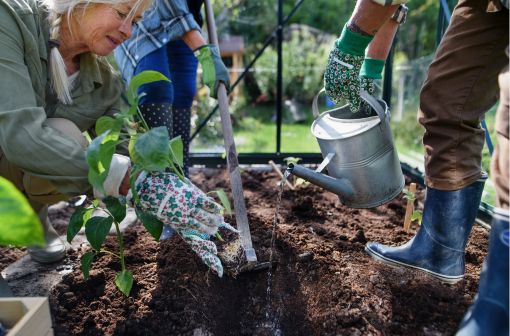“People are currently not feeling very satisfied. And the cost-of-living crisis is no doubt contributing there.”—Dr Kate Lycett, School of Psychology, Deakin University
Key points
- The results from the Wellbeing Index show that “people are clearly quite unsatisfied,” says Dr Kate Lycett, lead researcher from Deakin University's School of Psychology.
- The Australian Unity Wellbeing Index has found that satisfaction with life in Australia and life as a whole both declined to their lowest levels on record, while Personal Wellbeing Index scores have dropped to the bottom of the average range.
- Australians seem to be feeling the impact post-pandemic, with concerns about our health, community connectedness and some emerging concerns about finances affecting our wellbeing.
Modern life can be messy and unpredictable. With work, life and everything in between, everyone is forced to muddle through their own ups and downs—not to mention those sudden curveballs that smack you right between the eyes.
Yet, for all these changes, whether they bring personal fortune or leave us feeling a little worse for wear, our subjective sense of wellbeing tends to hold remarkably steady. During the 22 years that we’ve been measuring the pulse of our nation through the Australian Unity Wellbeing Index, in partnership with Deakin University, we’ve found that subjective wellbeing has remained a resilient life measure that’s rarely prone to dramatic fluctuations.
In 2022, however, the results from our recent national survey bucked that trend. This marks the first time in over a decade that we’ve seen such a consistent decline, with several measures of wellbeing falling below the average range. The average range is a measure of what is considered normal or to be expected based on past results. So these changes indicate that Australians are likely to be facing unprecedented challenges, both as a nation and as individuals.

Our pattern of decline in life satisfaction
In 2022, the measure that asks people to rate how satisfied they are with their lives as a whole, Global life satisfaction, fell to its lowest level in 21 years.
"That's basically a reflection of how satisfied people are feeling with their lives in general," explains lead researcher Dr Kate Lycett, from Deakin University's School of Psychology. “And people are clearly quite unsatisfied compared to other years. We also saw a similar result when it came to people’s satisfaction with their lives as a whole, which was also the lowest on record.”
A more comprehensive measure of how we’re faring is called the Personal Wellbeing Index (PWI). This tracks our satisfaction across seven key "domains" or areas of life—standard of living (finances), health, achieving in life (sense of purpose), relationships, personal safety, community connectedness and future security.
The results weren’t positive in 2022. Although average PWI scores remained just within the normal range, this reflected a notable drop from a relatively high result in 2020. This drop was also reflected across priority groups including people who were unemployed, or with household incomes below $30,000, whose scores fell to their lowest on record.
In addition, we saw some new groups record their lowest score on record, such as those aged 18-25 years and Queenslanders. “Scores on the Index for young people, and groups who generally fare okay, were particularly low in 2022,” says Kate. “If we think about what that means, likely reflects the overall decline in people’s wellbeing and certain groups are really struggling in our community.”
The impact of a difficult year
So what exactly is behind this national drop? While multiple factors are at play, Kate believes the polycrisis—the pandemic, rising cost of living, and climate urgency— that was, and still is, upon us played an important role.
The survey took place between May and June 2022, and at this point Australians had only recently emerged from the dark days of lockdown, any optimism that the COVID-19 virus was now behind us was quashed as the pandemic continued to cause disruption.
While Personal Wellbeing Index scores did stay just within the average range, satisfaction with our Health and our sense of Community Connectedness, fell below the average range. These results were their lowest levels in 21 years. Achieving in Life also recorded its lowest score, although it remained within the average range, just.
“The community connectedness domain had a significant fall. And that’s concerning because we know people get so much benefit from community. That’ll be a really interesting one to watch and see what happens in the future.”
When it came to our own health, Kate says, Australians felt vulnerable on multiple fronts, causing our satisfaction with our health to drop for the second year in a row.
“The Australian Unity Wellbeing Index was collected in June 2022 at a time in winter when COVID-19 was raging alongside flu and RSV [respiratory syncytial virus],” says Kate. “One respiratory physician I know described it as being a ‘cocktail of illnesses’.
“At the same time, we know that people were struggling to get GP appointments and there were staff shortages across hospitals and the health system was clearly in distress. So I think that all contributed to the health domain dropping.”

Growing financial challenges
Your perception of your health invariably colours your daily outlook. But that predicament has also played out against a backdrop of growing financial insecurity.
Rising interest rates have prompted widespread unease in a country where property prices remain high in relation to average incomes, prompting many borrowers to take on sizeable loans. As the Reserve Bank of Australia began to hike rates from May 2022 in a bid to tackle inflation, many households faced immediate pressure.
“People’s satisfaction with the economy and their finances fell in 2022, despite remaining within the normal range,” Kate admits. “People are currently not feeling very satisfied on this front. And the cost-of-living crisis is no doubt contributing here.”
It’s something Esther Kerr, CEO of Wealth and Capital Markets at Australian Unity, is observing too.
“All of the drivers of financial wellbeing are being hit at once—absolute wealth is being hit, assurance and certainty are being hit, and confidence in the future is being hit," Esther says.
“I wonder whether we’ll see conditions, like cost-of-living challenges, hitting even resilient Australians and impacting on their wellbeing. I think there will be a lag of three or more years, from when things started to get worse objectively.”
The “new normal” that COVID-19 left in its wake has turned out to be a difficult environment that continues to pose multiple challenges to us all. But while the Australian Unity Wellbeing Index data highlights some daunting issues, we also know that our wellbeing is usually stable and resilient. It's that knowledge that offers a flicker of hope.
If the information in this article has raised mental health concerns, remember support is available. You can call Lifeline on 13 11 14, or Beyond Blue on 1300 224 336.
Disclaimer: Information provided in this article is of a general nature. Australian Unity accepts no responsibility for the accuracy of any of the opinions, advice, representations or information contained in this publication. Readers should rely on their own advice and enquiries in making decisions affecting their own health, wellbeing or interest. Interviewee titles and employer are cited as at the time of interview and may have changed since publication.


